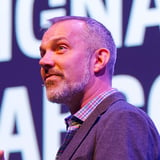Summary
Accessibility is an essential aspect of inclusive design that considers the diverse needs of all people, including those with disabilities. Yet, accessibility is often treated as an afterthought, a task to check off, rather than as a process that’s integral to the experience. This session will guide you in moving beyond "fixing problems" to developing thoughtful, sustainable design practices that address and reduce barriers. Discover how building accessible processes that capture dynamic user needs make service design more inclusive and valuable for everyone.
Key Insights
-
•
Disability is better understood through the social model, focusing on changing environments and systems rather than 'fixing' people.
-
•
Designs that require photographic ID exclude people without cameras, passports, or sufficient data, creating invisible barriers.
-
•
Account lockout processes relying solely on phone calls exclude deaf, hard-of-hearing, non-verbal, socially anxious, or non-US users.
-
•
Complex password rules disproportionately disable people with cognitive challenges and those managing multiple passwords.
-
•
Early accessibility inclusion in service design drastically reduces development costs and complexity.
-
•
Providing multiple accessible alternatives (e.g., third-party login, in-person verification, chat support) broadens inclusion.
-
•
Designing for the edge cases of accessibility benefits a much larger population, solving diverse user challenges.
-
•
Holistic service design must treat digital and physical services as integrated rather than separate products.
-
•
Contrary to misconceptions, complex and technical products can be fully accessible with modern assistive technologies.
-
•
The rise of AI makes service design more critical than code testing, requiring inclusive data and process design.
Notable Quotes
"Disability isn’t a problem with a person; it’s something that happens when systems fail to enable them."
"When you design for the edges, you get the middle for free."
"Are you really gonna say that somebody who speaks three other languages is disabled? No, but your design disables them."
"Early inclusion is less costly and more effective than retrofitting accessibility later."
"Accessible experiences are for everyone—they make things better for everyone, not just people with disabilities."
"Complexity is not a barrier to accessibility; even complicated games like The Last of Us are accessible."
"We cannot change people, but we can change systems, processes, and environments."
"Digital and physical services must be designed as the same thing, not separate products."
"Password complexity and frequent resets disable people with cognitive challenges and create frustration for all users."
"AI is not naturally testable in the same way as code; service design will become even more important."
Or choose a question:
















More Videos

"Rapid iteration with three to five user interviews is often enough to inform design and validate accessibility effectively."
Kate KalcevichIntegrating Accessibility in DesignOps
September 23, 2024

"Bumble’s feature of women making the first move was a powerful cultural lift addressing a huge challenge."
Neil BarrieWidening the Aperture: The Case for Taking a Broader Lens to the Dialogue between Products and Culture
March 25, 2024

"What we do can potentially be bigger than optimizing conversion rates; it can help build a more peaceful world."
Jim KalbachPeace is waged with sticky notes: Mapping Real-World Experiences
June 14, 2018

"Researchers are translators, storytellers, facilitators, and bridge builders. I love that bridge-building dimension."
Rebecca BuckMission: Keep Talent in Research Roles!
March 10, 2021

"There are too many things all over the place. I would like to use my magic wand for making them one system."
Abby Covert Tomer SharonPanel: Collaboration Tools
November 6, 2017

"Accessible experiences are better experiences for everyone whether you are a person with a disability or not."
Sam ProulxOnline Shopping: Designing an Accessible Experience
March 28, 2023

"Delivery is trust—doing what you said, avoiding overpromising, and delivering quality."
Melissa Eggleston Maya Israni Florence Kasule Owen Seely Andrea SchneiderPractical People Skills for Building Trust on Teams and with Partners
December 9, 2021

"Our purpose is to enrich people’s lives with technology, focusing on how to use—not just what to buy."
Sara Asche Anderson Jamie KaspszakNot Your Ordinary Re-Brand: Design's Path to Driving Customer Obsession at Best Buy
January 8, 2024

"The little girl I once was learned to slow down and trust her own leadership."
Tutti TaygerlyMake Space to Lead
June 12, 2021
















